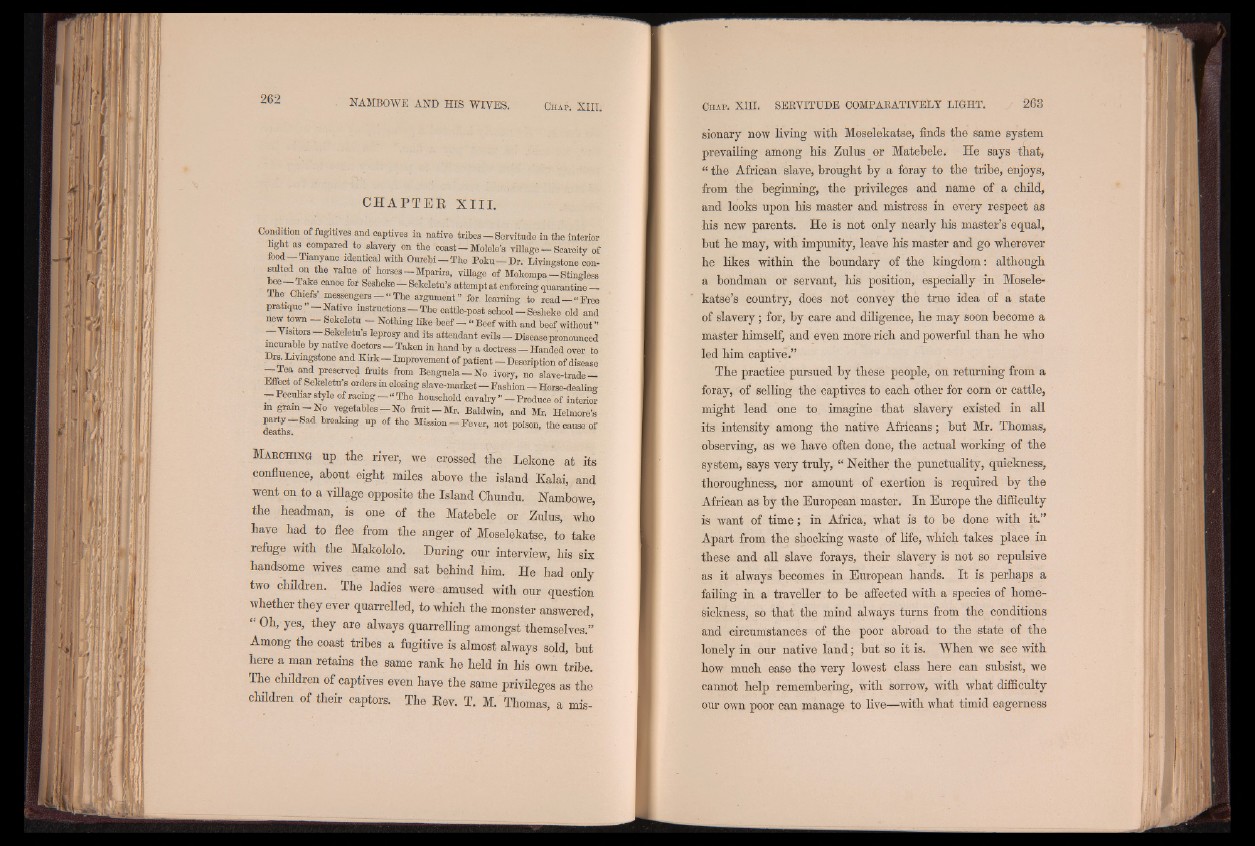
C H A P T E R XI I I .
Condition of fugitives and captives in native tribes — Servitude in the interior
ligbt as compared to slavery on the coast — Molele'a village — Scarcity of
food-Tianyane identical vrith O urebi-The P o k u -D r. Livingstone consulted
on the value of horses —Mparira, village of Mokompa— Stingless
b e e -T a k e canoe for Sesheke-Sekeletu’s attempt at enforcing quarantine -
The Chiefs’ messengers — “ The argument” for learning to read—“ Free
pratique’’-N a tiv e instructions - The cattle-post school - Sesheke old and
new town — Sekeletu - Nothing like beef — “ Beef with and beef without I
. ” 3 ~ Sekeletu’s leprosy and its attendant evils - Disease pronounced
mcumble by native doctors - Taken in hand by a doctress - Handed over to
Dra Livingstone and Kirk—Improvement of patient—Description of disease
- T e a and preserved fruits from Benguela-No ivory, no slave-trade-
Effect of Sekeletu’s orders in closing slave-market — Fashion—Horse-dealing
- Peculiar style of racing - “ The household cavalry ” - Produce of interior
m g r am -N o vegetables-No fo n t -M r . Baldwin, and Mr. Helmore’s
p a rty -S a d breaking up of the Mission - Fever, not poison, the cause of
deaths.
Makching up the river, we crossed the Lekone at its
confluence, about eight miles above the island Kalai,,and
went on to a village opposite the Island Chundu. Nambowe,
the headman, is one of the Matebele or Zulus, who
have had to flee from the anger of Moselekatse, to take
refuge with the Makololo. During our interview, his six
handsome wives came and sat behind him. He had only
two children. The ladies were , amused with our question
whether they ever quarrelled, to which the monster answered,
“ Oh, yes, they are always quarrelling amongst themselves.”
Among the coast tribes a fugitive is almost always sold, but
here a man retains the same rank he held in his own tribe.
The children of captives even have the same privileges as the
children of their captors. The Eev. T. M. Thomas, a missionary
now living with Moselekatse, finds the same system
prevailing among his Zulus or Matebele. He says that,
“ the African slave, brought by a foray to the tribe, enjoys,
from the beginning, the privileges and name of a child,
and looks upon his master and mistress in every respect as
his new parents. He is not only nearly his master’s equal,
but he may, with impunity, leave his master and go wherever
he likes within the boundary of the kingdom: although
a bondman or servant, his position, especially in Mosele-
katse’s country, does not convey the true idea of a state
of slavery; for, by care and diligence, he may soon become a
master himself, and even more rich and powerful than he who
led him captive.”
The practice pursued by these people, on returning from a
foray, of selling the captives to each other for corn or cattle,
might lead one to imagine that slavery existed in all
its intensity among the native Africans; but Mr. Thomas,
observing, as we have often done, the actual working of the
system, says very truly, “ Neither the punctuality, quickness,
thoroughness, nor amount of exertion is required by the
African as by the European master. In Europe the difficulty
is want of tim e ; in Africa, what is to be done with it.”
Apart from the shocking waste of life, which takes place in
these and all slave forays, their slavery is not so repulsive
as it always becomes in European hands. It is perhaps a
failing in a traveller to be affected with a species of homesickness,
so that the mind always turns from the conditions
and circumstances of the poor abroad to the state of the
lonely in our native lan d ; but so it is. When we see with
how much ease the very lowest class here can subsist, we
cannot help remembering, with sorrow, with what difficulty
our own poor can manage to live—with what timid eagerness